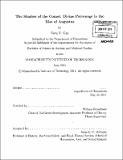The Shadow of the comet : divine patronage in the rise of Augustus by Dora Y. Gao.
Author(s)
Gao, Dora Y
DownloadFull printable version (7.574Mb)
Alternative title
Divine patronage in the rise of Augustus
Other Contributors
Massachusetts Institute of Technology. School of Humanities, Arts, and Social Sciences. History Section.
Advisor
William Broadhead.
Terms of use
Metadata
Show full item recordAbstract
This thesis explores the appearance alleged by ancient sources of a comet over Rome in 44 B.C. and its role in the use and abuse of divine patronage in the rise of the young Octavian between 44 and 27 B.C. The comet was concluded to have actually occurred through an analysis involving Poisson statistics, basic calculations of orbital dynamics, and historical context. The physical manifestation of this comet over Rome granted Octavian the opportunity to begin asserting himself as a legitimate political competitor in the wake of Julius Caesar's death and his adoption in Caesar's will. With the comet as a symbol of his father's deification, Octavian's new status as divi filius portrayed him as a pious young man dedicated to the traditions of the Roman Republic and won him the early support of the people, the legions, and the Senate. This image persisted through the 30s and became far preferable to that of the drunk and eastern Marc Antony when Octavian began to associate himself with the very Roman and republican figure of Apollo. Together, Julius Caesar and Apollo became two key divine patrons behind Octavian, with the generous Julius Caesar representing the more public aspects of Octavian's plan for Rome, and Apollo portraying the more personal side of Octavian's character and his dedication to the harmony of the Republic.
Description
Thesis (S.B. in Ancient and Medieval Studies)--Massachusetts Institute of Technology, Dept. of Humanities, 2011. Cataloged from PDF version of thesis. Includes bibliographical references (p. 80-82).
Date issued
2011Department
Massachusetts Institute of Technology. History Section; Massachusetts Institute of Technology. Department of HumanitiesPublisher
Massachusetts Institute of Technology
Keywords
Humanities, Arts, and Social Sciences. History Section.